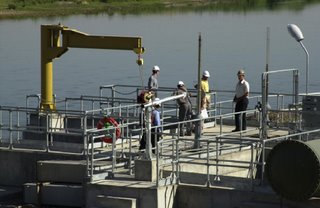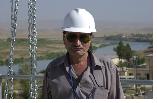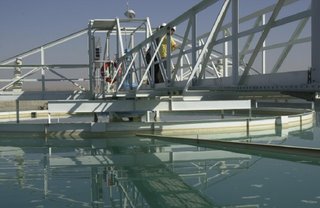New Water Treatment Plant Delivering Fresh Drinking Water to Major Iraqi Cities
 (Ifraz, Iraq) - Iraq is drained by the Tigris-Euphrates river system, even though less than half of the entire basin lies within the country. Both rivers rise in the Armenian highlands of Turkey and are fed by melting snow.
(Ifraz, Iraq) - Iraq is drained by the Tigris-Euphrates river system, even though less than half of the entire basin lies within the country. Both rivers rise in the Armenian highlands of Turkey and are fed by melting snow.
The Great Zab River is a tributary to the Tigris and flows down through the high Zagros Mountains before joining the Tigris south of Mosul.
The Great Zab has been used for irrigation, flood control and hydroelectricity.
But now - thanks to an almost $200 million investment by the United States - the Great Zab is the site of a U.S. Army Corps of Engineers water treatment plant in Ifraz. The center is pumping fresh drinking water 20-miles southeast to the city of Erbil.
"Currently, the plant is pumping 4,000 cubic meters of potable drinking water per hour," said Nousak Raouff, who is a civil engineer and the project manager. "When the electrical grid is updated in January, we’ll be able to deliver 6,000 cubic meters per hour to the one million citizens in Erbil."
Two more clarifiers can be added as Erbil grows which would bring total capacity to 10,000 cubic meters per hour.

“Currently, the plant is pumping 4,000 cubic meters of potable drinking water per hour,” said Nousak Raouff, who is a civil engineer and the project manager. “When the electrical grid is updated in January, we’ll be able to deliver 6,000 cubic meters per hour to the one million citizens in Erbil.”
Two more clarifiers can be added as Erbil grows which would bring total capacity to 10,000 cubic meters per hour.
The plant pulls water from the Great Zab River into a tank where it is pumped through one of six giant, cylindrical, concrete clarifying tanks. The clarifiers remove heavy debris from the river. The water is then pushed through a filter of fine sand and charcoal. Chemicals are added to achieve optimum levels of pH and alkaline before being pumped through 20-miles of pipeline at 1.6 million gallons per hour to Erbil.

The water is fed to a 5.2 million gallon storage tank that sits high above - and 3 miles east of - Erbil in the village of Dawajin. Gravity then carries the water down into Erbil’s 54 sectors of network piping.
The collateral benefits of the water treatment plant are numerous. In addition to fresh potable drinking water the system is increasing water pressure at the tap which in turn reduces the potential for contamination.
 Residents no longer have to wash their fruits, vegetables and meats in contaminated water. And since the old, historic wells can now be capped, the natural aquifer can be rejuvenated and used exclusively for Iraqi agriculture.
Residents no longer have to wash their fruits, vegetables and meats in contaminated water. And since the old, historic wells can now be capped, the natural aquifer can be rejuvenated and used exclusively for Iraqi agriculture.Photos and story by Paul McKellips, U.S. Department of State, Public Affairs GO Team, on assignment in Ifraz, Iraq.


0 Comments:
Post a Comment
<< Home